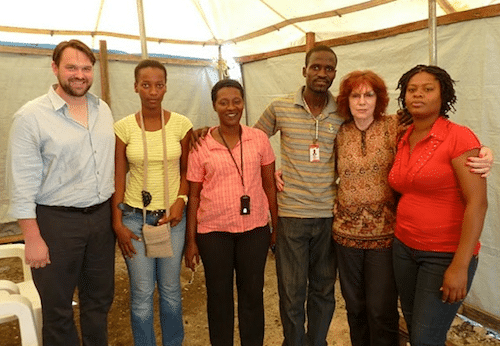East Africa Update
Our Leadership Team Makes New Alliances and Reaffirms Existing Ones in our Work to End the Use of Child Soldiers in East Africa
This Fall provided ideal timing for our co-founders to shore-up important project work in Kenya, Rwanda and Uganda.
In late September, Travis and Diane journeyed to East Africa for several important regional events – allowing for follow-up to our ongoing child soldier reintegration efforts, while making inroads to support new initiatives.
Along the way, Travis and Diane were able to meet-up with some old friends of the Institute, re-establishing ties with some of the folks who took part in our earliest 'grassroots partnerships.'
What Took our Leadership Team to Kenya and Rwanda
Beginning with our work in Colombia in 2007, the Goldin Institute has spent several years working on the issue of Child Soldier Reintegration. What started as a National Partnership in that same year to engage Colombia's social, private and public sector agencies to prevent the victimization of vulnerable young people in armed conflict, has expanded in most recent years to include the ESPERE project throughout Latin America and the successful sharing of the methodology with our newest partners in Eastern Africa.
An Opportunity to Stop the Recruitment and Abduction of Child Combatants
As our work in Kenya, Rwanda and Uganda has been focused on helping young people avoid recruitment into violent extremist groups, particularly Al-Shabab, Diane and Travis traveled to Africa for an important opportunity to stop the recruitment (and in some cases abduction) from happening in the first place. This new project has two primary elements – a youth leadership development component named the Youth Peace Ambassadors and the public solidarity element named CRAVE: Community Resistance to Violent Extremism. The Goldin Institute is partnering with an established organization already on the ground, known as Peaceful Innovation. Through this partnership we are focusing on the areas from which local extremist group Al-Shabab has done heavy recruiting – the Mombasa Coast, "slum" areas in Kenya and the refugee and IDP camps in Rwanda. Peaceful Innovation offers the youth who are being targeted by Al-Shabab an effective mixture of counseling, peer groups, and job training with the end goal of reducing the number of viable recruits for Al-Shabab, thus, reducing their size and acts of extreme violence.
The Official Launch of Alone and Frightened - Former Child Soldiers Get to Tell Their Own Story
Over the years, the Goldin Institute has worked with Arigatou International and the Global Network of Religions for Children to research, document, and analyze the experiences and challenges of former child soldiers to develop appropriate programs for their reintegration. The culmination of the research was released in the report Alone and Frightened: Experiential Stories of Former Child Soldiers on Improving Reintegration. While the report was published in 2014, the official launch occurred while Travis and Diane were in Kenya. Our colleague and former Global Associate Dr. Dorcas Kiplagat, was instrumental in both the research done in bringing together the child soldiers to tell their stories in Alone and Frightened and in bringing it to print, so it was fitting that Dr. Kiplagat was so involved in the official launch ceremony. To that end, Dorcas has shared this full report of September's Events.
We remain encouraged to see that with the expansion of our child soldier work into new regions and with new partners, we get closer to participating in an effort that ends the recruitment of child soldiers. To learn more and become more involved, please follow this link.
Revisiting Microfinance
Marking an important anniversary date on microfinance policy
Today we revisit our appearance on Worldview exploring the policies and ongoing scrutiny put on the effectiveness of microfinance programs in places like India and Bangladesh.

Informed by our project work in Bangladesh, where we set out to improve the way that microcredit was implemented from the perspective of borrowers, Executive Director Travis Rejman was interviewed to discuss the current practices in place by large banks and how they could improve their lending methods by taking into account what we learned in our research and project developments.
If you didn't get a chance to hear the interview when it originally ran, it is archived and available for stream here. Joining Travis on the show, was our partner from Grantmakers Without Borders Susan Beaudry. We collaborated with Susan to help donors sort through the facts and spin associated with microcredit lending practices in the downloadable guide: Microfinance: A Guide for Grantmakers.
Goldin Institute Successfully Returns to Uganda

This June, Institute co-founders Diane Goldin and Travis Rejman returned to Uganda to participate in our first ever cross-continental Child Soldier Reintegration and Reconciliation Training Workshops. Because of her work in developing and using the ESPERE methodology in her native Colombia, our Global Associate Lissette Mateus Roa was the natural candidate to lead the training in Uganda.
Before bringing this project to Africa, Lissette worked closely with our partner and her advisor, Fr. Leonel Narvaez designing and successfully testing the ESPERE methodology to engage local communities by using schools as centers for reconciliation for former child soldiers in the region. We highlighted their work and what this looks like on-the-ground in Colombia in previous reports.
To best adapt the training to our colleagues in Africa, an intensive eight-day workshop was conducted wherein participants learned about the key concepts of forgiveness and reconciliation, and obtained tools to carry these ideas forward within their communities.
In all, Lissette successfully trained 16 individuals made up of child combatants, teachers, crisis counselors and community members. These participants represented five different regions of Northern Africa and because each certified trainer committed to individual action plans upon completion, the outreach within their communities will impact many more potential trainees. In short, Lissette has left a "teaching tree" model in place that we hope to see expand and carry forth the ESPERE program within the region.
[quote]My expectations were different than the reality in Africa, normally the mass media shows to the world the bad things about Africa, I was expecting some kind of hungry people, in a dusty or dirty environment, waiting for water and food. But, I realized (once there and on the ground) that they have needs, but also they have so many good things that the mass media doesn't talk about: they are a happy and generous people, (there are) amazing buildings for education, they are bilinguals and have spoken their own language and English since they were kids, they have some kind of sense of community that we have lost in our developed societies, and is highly necessary for healing our societies – they are ahead of the game in that sense. I realized we have as many things to learn from them as they can learn from us. I'm not saying everything is perfect, I'm just saying that not everything is bad, and there is great hope for the future because of the people. Moreover, I was expecting a very rough place but it was a beautiful place for the workshop."[/quote]
- Global Associate and program facilitator, Lissette Mateus Roa
Lissette's excerpted comments above are from a conversation with her upon her return from Africa. The full interview can be found here.
In coming months, we look forward to sharing the results of the action plans established by the trainees at Lissette's ESPERE workshop, as they carry out the mission to bring societal changes to their own communities in Northern Africa. If you would like to become more involved supporting this project, find out how you can help.
[slide] [img path="images/slideshow/full/uganda2014_1.jpg"]Co-founder's Diane Goldin and Travis Rejman meet with Everest Okwonga, the Principal at St. Janani Luwum Vocational Training Centre[/img] [img path="images/slideshow/full/uganda2014_2.jpg"]Co-founder's Diane Goldin and Travis Rejman meet with students at a trade school for former child combatants in Gulu[/img] [img path="images/slideshow/full/uganda2014_3.jpg"]Co-founder Diane Goldin meets with students in a Gulu classroom during the Institute's June2014 trip to the region to take part on child soldier reintegration efforts[/img][img path="images/slideshow/full/uganda2014_4.jpg"]Participants of a workshop conducted by Global Associate Lissette Mateus Roa take part in one of the exercises teaching 'forgiveness'[/img][img path="images/slideshow/full/uganda2014_5.jpg"] Global Associate Lissette Mateus Roa (bottom left) and her group of ESPERE students. Also included is friend and colleague and Associate emeritus Dr. Dorcas Kiplagat (standing 5th from right)[/img] [img path="images/slideshow/full/uganda2014_6.jpg"]Participants of the ESPERE workshop during a training session[/img][img path="images/slideshow/full/uganda2014_7.jpg"]Global Associate Lissette Mateus Roa (standing) leads a training session in Gulu[/img][img path="images/slideshow/full/uganda2014_9.jpg"]Global Associate Lissette Mateus conducts an exercise with participants of the ESPERE workshop in June 2014[/img][img path="images/slideshow/full/uganda2014_15.jpg"]Global Associate Lissette Mateus (sitting foreground) leads her ESPERE training group[/img][img path="images/slideshow/full/uganda2014_28.jpg"]Co-founder Diane Goldin meets with students at the St Janani Vocational School. The School is made up of mostly former child soldiers learning new skills (like carpentry in this classroom) to rejoin civilian life.[/img] [img path="images/slideshow/full/uganda2014_27.jpg"]The workshop attended by former child combatants[/img][img path="images/slideshow/full/uganda2014_34.jpg"]Institute co-founder Diane Goldin meets with Ajok Dorah - a psychologist specializing in giving counsel to former child combatants returning to their communities.[/img][/slide]
Goldin Institute's Travis Rejman Interviewed on Worldview
Interested in learning more about the promise and peril of microcredit?
The current debate about the efficacy of microfinance is marked by the absence of those who have most at stake in the controversy: loan recipients. The Goldin Institute is working to lift up these voices—most often marginalized women—and restore their perspectives, insights and aspirations to the discussion.
Based on the Goldin Institute's work in Bangladesh to listen to loan recipients and lift up their voices as the basis for improving microcredit, Executive Director Travis Rejman speaks with Jerome McDonald on NPR's Worldview Program to provide perspective and analysis on the microcredit movement. We were thrilled to be joined for the interview with our colleague Susan Beaudry from Grantmakers Without Borders who edited the Funders Guide to Microcredit.
The conversation can be listened to in it's entirety by direct stream or downloadable podcast by clicking here.
Rape Accountability and Prevention in Haiti
Executive Summary of the Project
Since the Jan. 12, 2010 earthquake in Haiti, women and girls living in the internally displaced persons camps face alarming rates of rape and other forms of gender-based violence. In many camps, the rate of gender-based violence has exploded to three times pre-earthquake levels. In the year since the earthquake, our partners at KOFAVIV have documented 640 cases of rape in 2010.
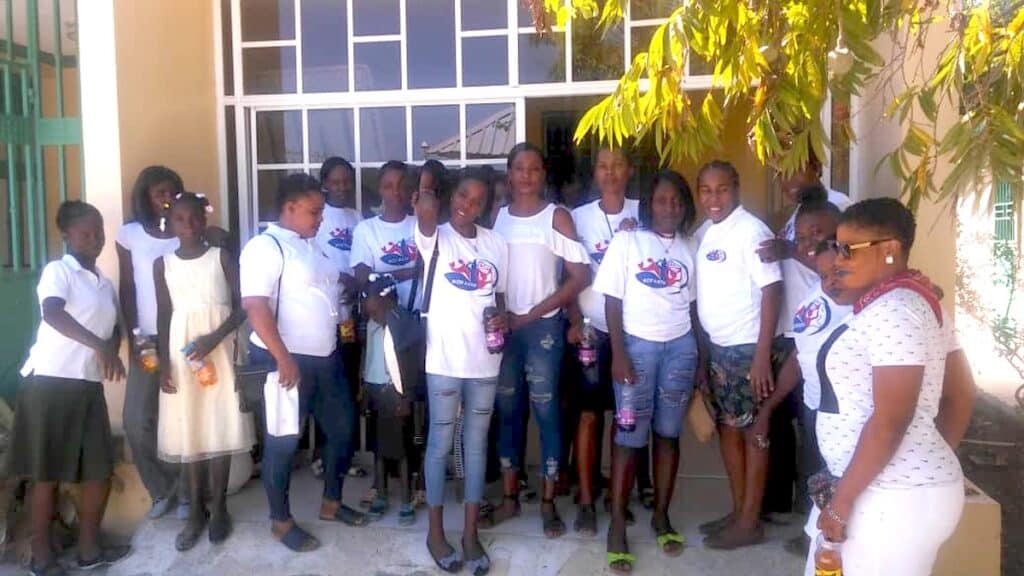
This pilot project is designed to provide security in the Place Petion community of Champ de Mars using women-led, community-based security teams to patrol the camp, discourage and disrupt incidents of gender-based violence and provide necessary escort services to vulnerable residents.
The Goldin Institute has partnered with KOFAVIV, FAVILEK, the Bureau des Avocats Internationaux (BAI), the Institute for Justice and Democracy in Haiti (IJDH) and its network of partners throughout Haiti to build and support a women-led, community-based pilot security platform in one representative displacement camp. This project builds on the strategy developed and implemented by KOFAVIV and FAVILEK, the GI's experience in creating grassroots partnerships for social change and the BAI / IJDH's capacity for legal advocacy in Haiti.
As part of the Rape Accountability and Prevention Project in Haiti, this security platform aims to prevent gender-based violence through the leadership and strategies of women's networks while the work of prosecution is ongoing. This pilot project is designed to serve as a model for community engagement and the provision of security that can be adopted by NGOs and the Government of Haiti.
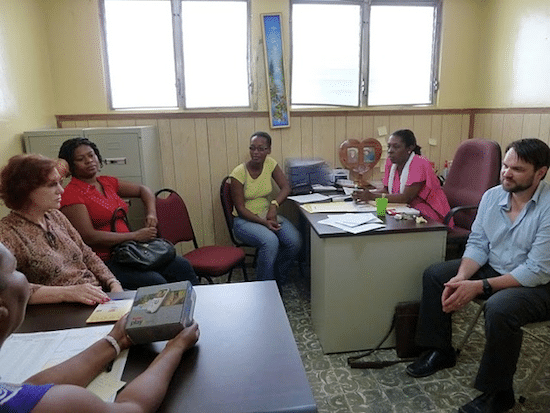
Project Rationale
The problem of GBV in post-earthquake Haiti must be understood within the broader context of the humanitarian response. There is a demonstrated lack of governmental response to sexual violence occurring in the camps. This failure to act appears to have two prongs—the Haitian Government lacks both the political will and the capacity to respond. Furthermore, despite billions of dollars being pledged by the international community for recovery, aid efforts have struggled to meet the basic needs of people living in IDP camps. Having no other options, Haitian grassroots women's groups have resorted to taking charge of their own security. Haitian women are both disproportionately impacted by the crisis and key to their country's recovery.
The reality is that grassroots women's groups have been mostly shut out from the process of crafting a response to the real threat of rapes in the camps. Meanwhile, they have mobilized their own solutions, distributing whistles to women living in camps and organizing groups of women to accompany each other to vulnerable locations like latrines, where many attacks have previously taken place. Each of the women engaged in the project brings a deep commitment to the work, and their life stories are a testament to that dedication.
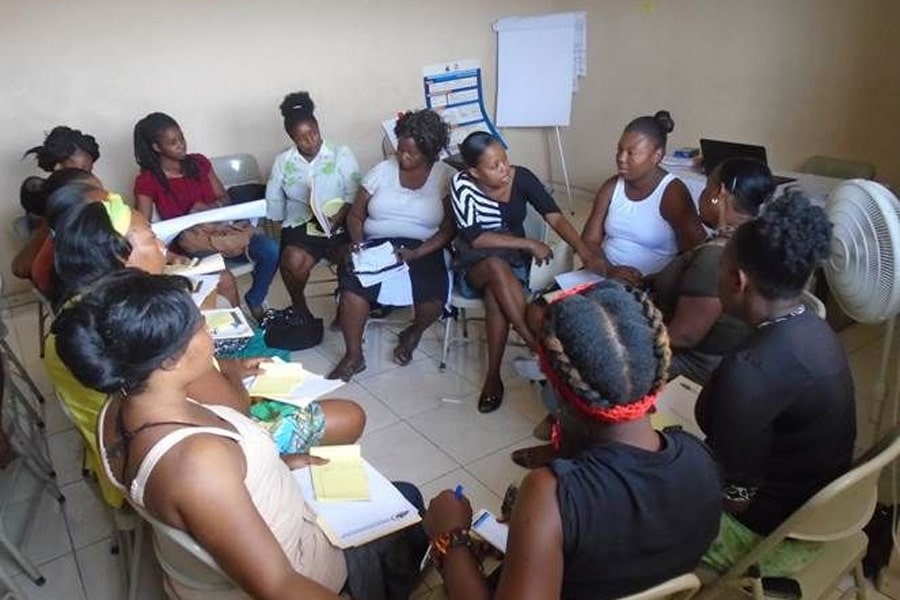
Brief History of the Project
The Haiti Rape Accountability and Prevention Project (RAPP) is designed to respond to the epidemic of rapes against poor women and girls in Haiti in the wake of the Jan. 12, 2010 earthquake. The program includes four closely integrated components: legal advocacy, healthcare, organizing, and public advocacy. RAPP provides individual victims of sexual assault the legal services they need to obtain justice and compensation, while working with allies in Haiti and abroad to transform the social context that underlies the vulnerability of all poor Haitian women to assault. The Project also aims to deter future rape by punishing the perpetrators and forcing a more effective response by law enforcement and the justice system. In February 2011, the Goldin Institute began its association with RAPP with the Camp Security and Sensitization Project.
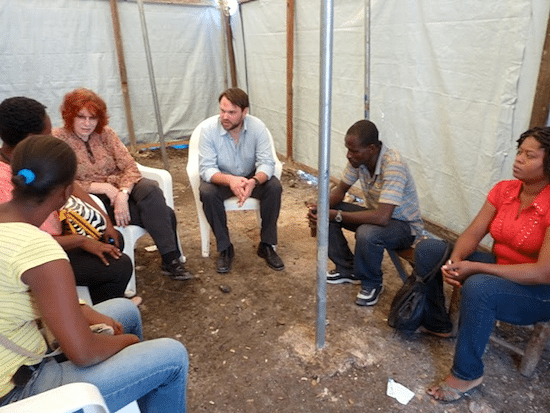
Shared Goals of the Project
This project seeks to substantially improve security and bring an end to gender-based violence in the camp where it is piloted in the Place Petion section of Champ de Mars. In addition to the immediate impact of improved security, we hope that it will provide some meaningful work for security providers and highlight the efficacy of partnering with community based groups, especially those led by women. We hope that this project will serve as a model for the Government of Haiti and relevant NGOs that will be able to scale up this important women-led, community-based initiative.
If successful, this project may also serve as a model for similar grassroots partnerships within the Goldin Institute's global network.
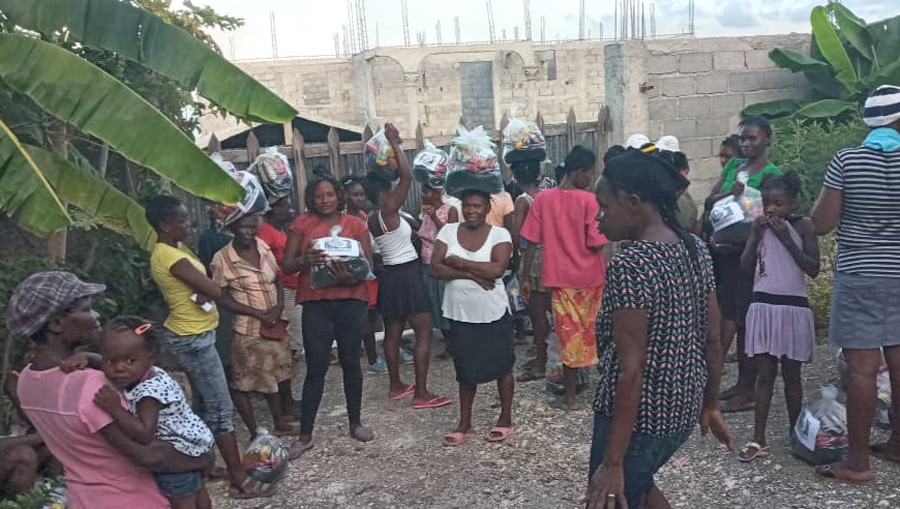
Project Outcomes
- Immediate and sustained reduction in gender-based violence in Champ de Mars.
- Improved sense of security for vulnerable people in Champ de Mars.
- Opportunity for women to design, lead and implement an innovative community based initiative.
- Increased cooperation between women's groups and the network of partners in Haiti.
- Augmented international profile for local partners through sharing the success of the project broadly.
- Opportunity to engage relevant parties in NGOs and the Government to educate them on the need and efficacy of working with grassroots groups, especially women's groups.

